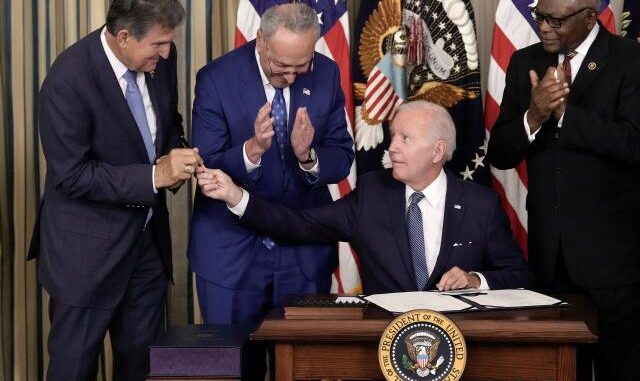
Reforms to oil and gas permitting being considered by Congress could have an impact on New Mexico’s fossil fuel industry – one that makes up about a third of the state’s budget.
The industry’s supporters worried that because about half of New Mexico’s extraction occurs on federal land, mostly in the Permian Basin which led the state to become the second-biggest producer of crude oil in the U.S., the state could potentially be more impacted than any other by the shifting tides of federal regulation.
U.S. Sen. Joe Manchin (D-WV), a frequent supporter of extraction including oil and gas and coal in his home state, introduced a bill last week to reform permitting policy for oil and gas companies looking to develop fossil fuels on federal land.
The bill, of which Democrat leaders in Congress signaled their support of, was believed to be the result of a deal Manchin struck for his support of the Inflation Reduction Act – a bill passed earlier this year to make federal investments in renewable energy and other initiatives based on reducing pollution and responding to climate change.
It was initially intended to be included in a Continuing Resolution (CR) voted on by Congress to avoid a government shutdown, but Manchin said on Tuesday that language was removed from the resolution as members of Congress could not reach an agreement.
The Act would set a maximum of two years for environmental reviews required under the National Environmental Policy Act (NEPA), and require projects be approved within 180 days of completing the reviews.
The bill would also set a statute of limitations of 150 days for permits, barring court challenges of permits after that timeline.
Critics of Manchin’s Energy Independence and Security Act argued it paved the way for expanded oil and gas development, which environmentalists argued would only exacerbate climate change and extreme weather events like wildfires and hurricanes.
But supporters said reforms were needed in how the government permits energy infrastructure to streamline the process and create shorter wait times to ensure the U.S. is able to produce much of its own energy and not rely on foreign, less-regulated sources.
New Mexico State Sen. Gay Kernan (R-42) said any regulatory obstacles at the federal level to oil and gas development could imperil production in New Mexico and stymie a key driver of the state’s economy.
She pointed to regulations under the administration of President Joe Biden, including a halt on new federal oil and gas land leases imposed in 2021 that was lifted under tighter environmental impact study requirements and a reduction in lands available to energy companies.
The Biden administration also raised royalty rates on oil and gas production on federal land from 12.5 percent to 18.75 percent.
These actions strained the industry, Kernan said, and could threaten economic growth in her state.
“Anything they do to mess with federal opportunities, it’s going to hurt New Mexico,” Kernan said. “What I would recommend is for Biden to reverse course. First, he wasn’t allowing any federal leases. Now he is, but the restrictions are such that it makes it pretty difficult.”
Manchin argued the reforms would not only assist fossil fuel development, but also provide better regulations for transmission lines, hydropower and renewable energy.
“No matter what you want to build, whether it’s transmission pipelines or hydropower dams, more often than not, it takes too long and drives up costs,” Manchin said in a statement upon introducing the bill. “You can double your cost within a five to six, seven-year period from what the original cost may have been.”
U.S. Rep. Yvette Herrell (R-NM) said before the House Oversight Committee’s Subcommittee on the Environment, of which she is ranking member, that the federal government must allow for more domestic production to protects Americans’ energy security.
She introduced the Energy Permitting Certainty Act in March to require the federal government to issue permits regardless of pending litigation, citing “frivolous lawsuits” from environmental groups backing up the permitting process and putting American energy supplies at risk.
“President Biden, reform the permitting process and remove obstacles from constructing modern energy infrastructure, so that working families in New Mexico do not have to live in fear of blackouts and brownouts,” Herrell said during the Sept. 19 meeting.
But New Mexico already suffered, opponents of the bill said, from expanded oil and gas production in the booming Permian Basin that covers the state’s rural southeast region and portions of West Texas, and environmentalists contended the bill would reduce the government’s ability to study the impacts of energy development on local communities, while pushing more fossil fuel projects.
Erick Schlenker-Goodrich, executive director at the Western Environmental Law Center said Manchin’s bill would limit oversight afforded by federal law by reducing environmental studies required for permitting.
“Successful climate action demands that we embrace and align two key objectives: the build-out of clean, renewable energy and the imperative to deliver on environmental justice for frontline and Indigenous communities,” he said.
“We simply cannot let ourselves be tied to outdated ideas, advanced by fossil fuel interests, that the systematic sabotage of crucial bedrock environmental safeguards is a solution. These reckless ideas will merely perpetuate the very problems that underlie the climate crisis we are now living through.”



